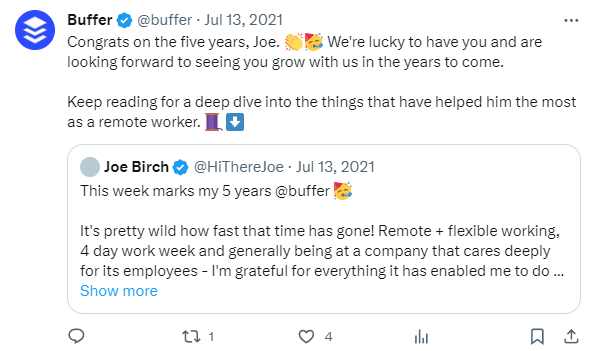Trust plays a vital role in any business — from attracting new customers and amplifying brand presence to attracting and retaining talent. Being able to portray brand trust is vital if you want to enhance your position on the market both as an employer and as a supplier of choice of a product or service. And to portray brand trustworthiness, you need authenticity — people seek it, and that’s what they react to.
The authenticity powerhouse of your own company is your employees — a trustworthy source of information, relatable to your public (whether you’re aiming to reach potential candidates or customers), and whose network is much wider than your own.
In fact, a study by Edelman found that 79% of people trust their coworkers over senior executives.
So, in this article, we will look at how employee advocacy and social proof can help drive brand trust.
Table of Contents
The role of testimonials
When thinking about testimonials, the most common instance that comes to mind is probably customer testimonials. They are an effective way to build trust and credibility with potential customers, attract prospects, and gain their confidence by simply letting others tell your story better, in their own words, unabridged and uninfluenced by your corporate identity.
Employee testimonials work on the same principles: they provide a firsthand account of one’s experience with your product or service, which can be a powerful tool for convincing others (both candidates and prospects) to take a desired action, such as making a purchase or applying for a job.
They provide people with a sense of transparency and authenticity, which, as we will see later on, is vital to making an impact on today’s market and social media especially.
The power of employee advocacy and social proof
A way to encourage sharing personal testimonials from employees is by formalizing their efforts through an employee advocacy program.
Employee advocacy is a strategy that involves employees promoting and supporting their company — online and offline. In the era of social media dominance, employees can become influential brand ambassadors, leveraging their networks to amplify the company’s message. This advocacy extends beyond traditional marketing efforts, as it relies on the genuine experiences and perspectives of those who work within the organization.
And that’s where authenticity comes in — the power of employee advocacy hinges on employees sharing their honest experiences on social media, which in turn exposes the brand to a much wider circle of reach. The inherent trust that employees portray thus reflects on the brand through personal testimonials.
When employees share their positive experiences, achievements, and insights, they humanize the brand. This authenticity resonates with consumers and potential candidates, as they are more likely to trust recommendations from real people rather than traditional advertising. And that’s why employees are considered the most trusted source of information about a company, even more than the CEO.
Personal testimonials and social proof
At the heart of employee advocacy lies the concept of social proof, a psychological phenomenon wherein people tend to follow the actions of others under the assumption that such actions reflect correct behavior.
In the business realm, social proof serves as a powerful tool to build credibility and trust by showcasing positive experiences with a product or service. Personal testimonials from employees, therefore, act as a form of social proof, substantiating the company’s claims and fostering an environment of trust.
Personal testimonials from employees serve as a form of social proof: in the context of business, social proof helps build credibility and trust by showing that others have had positive experiences with a product or service. When employees share their success stories, challenges overcome, and personal growth within the company, they contribute to the overall social proof of the brand.
These testimonials are not just limited to written statements. They can take the form of video testimonials, blog posts, or even live social media interactions. This kind of content has a profound impact on the audience, creating a deeper connection and understanding of the brand.
Building trust through transparency
Transparency is a key element in building trust. By encouraging employees to share their experiences openly, including both successes and challenges, a company demonstrates transparency. When potential customers see that employees are willing to discuss both the positives and negatives, it adds a layer of authenticity to the brand, which can work in its favor.
Encouraging employees to share their experiences openly, encompassing both triumphs and challenges, positions the company as genuine and trustworthy. When consumers observe that employees are candid about both the positives and negatives, it instills confidence in the brand’s authenticity.
Personal testimonials, when addressing common concerns or misconceptions, become a potent tool for rectifying potential doubts. If an employee shares how the company actively addresses customer feedback or consistently strives for improvement, it not only dispels doubts but reinforces the brand’s commitment to customer satisfaction. This transparency through personal narratives serves as a testament to the brand’s integrity and willingness to learn and adapt.
Moreover, personal testimonials can address common concerns or misconceptions that consumers may have. If an employee shares how the company actively addresses customer feedback or constantly strives for improvement, it reinforces the brand’s commitment to customer satisfaction.
Brand trust is the key ingredient to enhancing attraction and retention
Employee advocacy and personal testimonials from employees have a much bigger ripple effect than just maximizing your corporate branding and marketing efforts. Its benefits go far beyond that, strongly influencing employer branding, talent attraction, internal culture, and employee retention.
Amplifying your employer brand
According to Nielsen, 92% of job candidates trust recommendations from friends and family more than any other form of advertising. That’s a mind-blowing statistic if you think about it, and how much power your current employees have to influence the choice and work-related decisions of your potential future employees.
If you think of the main pillars of employer branding, then you’ll see how pivotal employees and their testimonials are in shaping and enhancing your employer brand. Brand humanization, company culture, and employee development, all three hinging on authenticity, are the keywords when it comes to generating a unique and strong offering as an employer that attracts genuine talent and generates brand trust.
The one fil rouge is your employees.
Glassdoor states that 86% of job seekers consider an employer’s reputation when deciding where to apply. Employee testimonials provide the authenticity that candidates crave, offering a real insight into what it’s really like to work for your organization. In fact, corporate messages, Social Media posts, and values sound hollow to the ears of your audience and the potential candidates you’re trying to attract if they are not mirrored by your employees. That’s why the social proof they can provide can’t be compared to any fabricated offering propagated by corporate channels only. Take this Buffer tweet as an example.
 On top of that, by sharing authentic stories as employee brand ambassadors, you turn them — your employees — into brand ambassadors. Their testimonials can be shared on social media platforms, professional networks, and review sites, exponentially increasing your brand’s visibility and impact. When motivated employees love the company they work for, they are the greatest asset of any organization. Not only can they help build brand trust, but they can assist in meeting marketing goals. They play a crucial role in increasing an organization’s productivity and growing revenue.
On top of that, by sharing authentic stories as employee brand ambassadors, you turn them — your employees — into brand ambassadors. Their testimonials can be shared on social media platforms, professional networks, and review sites, exponentially increasing your brand’s visibility and impact. When motivated employees love the company they work for, they are the greatest asset of any organization. Not only can they help build brand trust, but they can assist in meeting marketing goals. They play a crucial role in increasing an organization’s productivity and growing revenue.
Now, incorporating personality test questions and answers into your employer branding strategy can further enhance this process. By integrating personality assessments into your hiring process, you can align potential candidates with your company’s values and culture.
A strong company culture to improve retention
Giving insights into your company culture is another way in which employee testimonials can strongly enhance brand trust and influence retention. Sharing insights into their work life, their habits, and the benefits and opportunities they have at your company, employees demonstrate commitment, passion, and dedication to their jobs. They show how much they appreciate your offering as an employer, which is a big factor when it comes to employee retention.
At the same time, it introduces new employees or potential hires to your values and shows them what your workplace is like.
Looking to improve your company culture? Ask these employee pulse survey questions.
Give your message a lot more credibility
Employee testimonials can lend a great deal of credibility to a company’s message by providing firsthand experiences of their product or service from the perspective of someone who works with and shows dedication to it.
By nature, testimonials provide an unbiased review of the company’s products and services, which is why people are naturally drawn to them and inclined to trust them much more than any message of the company itself.
This can be an invaluable tool for building and amplifying brand trust in potential customers. On top of that, employee testimonials can also provide a good benchmark for a company’s message, showing how the company’s services have helped different people in different ways — again, an unbiased perspective and voice that is sure to be trusted above the corporate one.
They provide credibility, trust, and perspective. These elements are invaluable when trying to win over potential customers—and they are far more useful than any marketing ploy or concept can present.
About the Author
Camilla Brambilla Pisoni is a Content Creator and copywriter at Ambassify
Related Posts
March 18, 2024
Technical SEO Audit: A 6-Step Guide to Improving Website Performance
0 Comments9 Minutes



